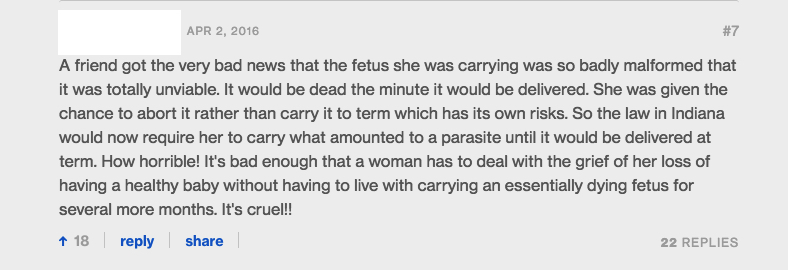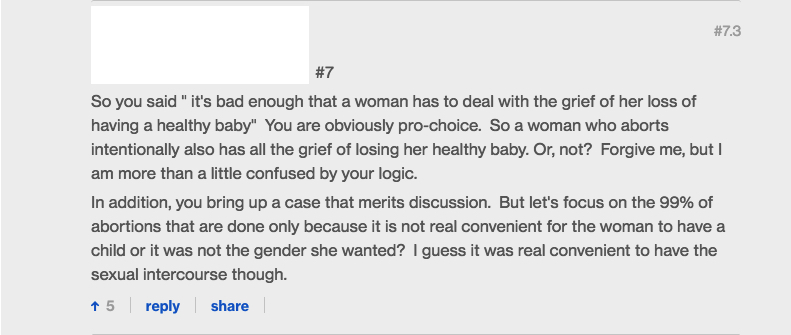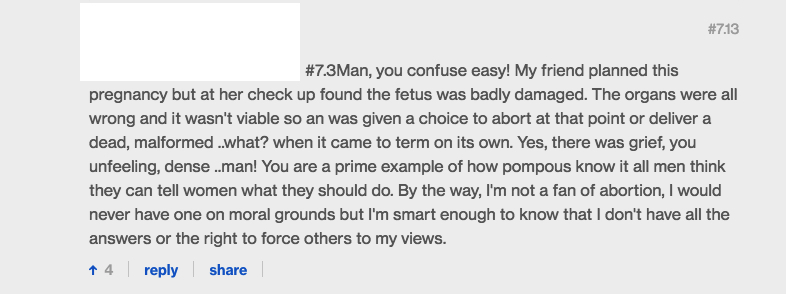"You Unfeeling, Dense...Man!": The Function of Standpoint Claims
Standpoint theory examines knowledge making and claims as socially constructed, often, in effect, reversing knowledge claims that privilege the perspectives of the powerful. Since women are on the oppressed side of a privilege/oppression axis, standpoint theory argues that women can have, make, and express knowledge about the world that those on the privileged side of the axis (men) cannot. As Nancy Naples and Carolyn Sachs (2000), described it, we can see "standpoint as embodied in individual knowers' spoken experiences and social identities" (p. 197). Standpoint theory has been criticized for its tendency towards relativism and for privileging Western white women's epistemologies (see McCaughey, 1993), and standpoint claims represent a common rhetorical strategy in the comments sections of news articles, both demonstrating the validity of some of the critiques while showcasing the rhetorical usefulness of the approach.
Women in the comments sections of the selected news articles regularly appealed to a version of applied standpoint theory when confronting sexist hostility, though the commenters may not describe the strategy in such terms themselves. When encountering gender stereotypes, sexist remarks, or attempts by men to speak over and for women, many women responded by claiming their own perspectives and experiences as sites of knowledge or knowledge-making that should be privileged over the perspectives and experiences of men. The standpoint claims represented a compelling rhetorical strategy and yet, like the theory itself, can and should be critiqued for their own frequent essentialism.
On MSNBC, for example, commenter Marina challenged a man for telling women what to do while not sharing women's experiences. Marina framed gender as a relevant factor in determining how remarks should be perceived and who has authority in the discussion. The comment in question, left by Lloyd Barr, argued that there would be "NO need" for abortion if women would use contraception. In response, Marina wrote, "The day you can become pregnant is the day your opinion is maybe worth taking seriously." Marina rejected the sexism in Barr's comment by connecting womanhood to the ability to bear children, as she argued that maleness prevents men from having a worthwhile opinion on women's choices. Since she framed herself and was responded to by others as a female commenter, Marina established an ethos that allowed her to identify the sexism in Barr's comment and offer a rebuttal to it. Commenting from a woman's perspective is regularly used as justification for identifying and rejecting sexism within the comments sections.
Gender was used as a salient explanatory point and a source of authority for commenters who made standpoint claims in the face of sexism. OldGrandma, for example, wrote a response to a man who said women, including OldGrandma, must be wrong or lying about their experiences with miscarriage and abortion. As OldGrandma put it, "Yes, there was grief, you unfeeling, dense ..man! You are a prime example of how pompous know it all men think they can tell women what to do." In examples like this, commenters oriented towards gender as a factor in evaluating other commenters' contributions to the conversation, particularly when those comments involve gender. The gender and standpoint of a commenter became forces that shaped experiences with pregnancy, miscarriage, or abortion, and thus shaped who is authored to speak to such experiences. OldGrandma's standpoint claim became a source of authority within the conversation, and allowed her to dismiss sexism outright.
Abortion is not the only topic on which women made standpoint claims, although it was by far the most common subject for using that rhetorical strategy. It is worth noting that standpoint claims, particularly as they pertain to abortion, occur in a way that centers cisgender women and ignores transgender men and all other people who may become pregnant but who are not women. Although the women's standpoint claims are made in response to sexism, a more capacious understanding of who can become pregnant could productively complicate the role of such claims in these contexts. Sexual harassment was another major area where standpoint became useful for women in the comments sections. For example, in response to the BuzzFeed article "A Canadian University Made This Blatantly Sexist Video Objectifying Female Professors," Helen Smith wrote,
I'm seeing a lot of comments from gaslighters saying "it's just a compliment," but no it's not and thinking that means you've either missed the context or are burying your head in the sand. Telling someone they look good like it was done here is objectification. It's an attempt to alter the balance of power. I've recieved a lot of "compliments" in my life and I've noted that virtually all of them that were not from friends or peers are a way to control the situation or the person. It's actually a pretty useful if nasty technique because if you compliment someone either like that or follow it up immedietly with a request or an attack they pretty much have to comply whether they want anything to do with you or not.
Smith's standpoint claim here stood as a direct challenge to the commenters she called "gaslighters": mostly men, who used the comments section of the article to claim that the sexual harassment portrayed in the video was clearly no more than a harmless compliment, and that backlash was evidence of feminist hysteria or typical female overreaction. In responding to these comments, Smith drew on her own experience with sexual harassment and manipulation, using them as a source of authority. Having been on the receiving end of behavior like that shown in the video, Smith claimed rhetorical and analytical expertise and challenged the sexist comments while also offering her own interpretation of why the video was received so negatively.
Standpoint claims appeared regularly in the comments sections, each time appealing to women's ways of knowing and arguing that as women, the commenters knew (and can know) more and better about the experience of sexism than men. Although a potentially useful rhetorical strategy, the essentialism of many standpoint claims highlights the issues with privileging one perspective without accounting for intersectionality or additional complexity. In writing about her wish for partial perspectives, for "limited location and situated knowledge," Donna Haraway (1991) made an "argument for situated and embodied knowledges and against various forms of unlocatable, and so irresponsible, knowledge claims," the type of problematic "objectivity" many men in the comments sections seem to prefer (p. 190–191). She also, however, warns that the "standpoints of the subjugated are not ‘innocent' positions," and that we must be cautious about not repeating the "god-trick" of claims to objectivity (p. 191). However, standpoint claims seem to be a preferred strategy for countering dominant and dominating sexist hostility in the comments sections.
Reading the Comments: Standpoint Claims
The following quotations and figures contain conversations pulled from the comments sections included in this study. Some of the comments are those analyzed in the preceding paragraphs; I chose the others to additionally demonstrate the rhetorical principle discussed in this section. All comments have been transcribed as they originally appeared including typos or idiosyncratic spellings, although some have been shortened for the sake of brevity.
Commenter names and avatars or profile images have been removed; pseudonyms have occasionally been added for clarity.

Commenter 1: A friend got the very bad news that the fetus she was carrying was so badly malformed that it was totally unviable. It would be dead the minute it would be delivered. She was given the chance to abort it rather than carry it to term which has its own risks. So the law in Indiana would now require her to carry what amounted to a parasite until it would be delivered at term. How horrible! It's bad enough that a woman has to deal with the grief of her loss of having a healthy baby without having to live with carrying an essentially dying fetus for several more months. It's cruel!!

Commenter 2 replying to Commenter 1: So you said " it's bad enough that a woman has to deal with the grief of her loss of having a healthy baby" You are obviously pro-choice. So a woman who aborts intentionally also has all the grief of losing her healthy baby. Or, not? Forgive me, but I am more than a little confused by your logic. In addition, you bring up a case that merits discussion. But let's focus on the 99% of abortions that are done only because it is not real convenient for the woman to have a child or it was not the gender she wanted? I guess it was real convenient to have the sexual intercourse though.

Commenter 1 replying to Commenter 2: Man, you confuse easy! My friend planned this pregnancy but at her check up found the fetus was badly damaged. The organs were all wrong and it wasn't viable so an was given a choice to abort at that point or deliver a dead, malformed ..what? when it came to term on its own. Yes, there was grief, you unfeeling, dense ..man! You are a prime example of how pompous know it all men think they can tell women what they should do. By the way, I'm not a fan of abortion, I would never have one on moral grounds but I'm smart enough to know that I don't have all the answers or the right to force others to my views.
Figure 17. ON BIRTH CONTROL
Commenter 1: There is NO need for any kind of abortion If a women wants sex for pleasure then visit the drug store first. . Period. There are at least 5 ways to prevent pregnancy as a result of sex. Educate and use them. The pill,IUE,abstinence,condoms and the after action pill. They work. They only work if they are used. Sex is fun and pleasurable. God made it that way. The primary purpose of sex is for procreation. It is NOT the only reason for sex. The purpose of all of these preventatives is to eliminate the asterix. The asterix is what the state has to take care of if they are not used.
Commenter 2 replying to Commenter 1: The day you can become pregnant is the day your opinion is maybe worth taking seriously.


Commenter 1:I was the only girl on an all boys wrestling team my freshman year of high school. I absolutely loved the sport but between threats, gropes, and sexual harrassment by other teams (that too went unpunished because *boys will be boys* and *she wanted to play on a boys sport team thats what she gets*) and a few of my own team mates cruel and sexist commentary I did not return sophmore year. Its been nearly 15 years and I still regret letting them chase me away. I finished that season but never went back on the mat. I miss it. Rock on girl! Little girls need strong rolemodels like you, not the bitchy drama queens on screen.
Commenter 2 replying to Commenter 1: i was super lucky at my school. Wrestling was getting more and more popular and although there were fewer girls than boys, we girls were treated with respect by the boys and we could spar with and learn from each other. Still, I heard way too many comments from non-wrestlers .. "girls can actually wrestle?" "isn't that too violent?" "won't that damage your reproductive system?" (that last one wasn't a joke, I'm afraid :( )
Figure 19. ON WOMEN
Commenter: Women's issues rarely get traction. I'm thinking all the way back to the ERA, which should have been a no-brainer. It's up to us ladies to raise a frigging stink. No one else really gives a $h!t.
Figure 15. ON OBJECTIFICATION
Commenter: Did he call her Miss?? When I finish up with my degree people can call me by my first name or they can call me Dr. but if they call me "Miss" or "Mrs." ... no. Hell I'll be correcting people at the grocery store. And I've had students give me *that* look and it inevitably means they don't get that homework applies to them as well. I'm seeing a lot of comments from gaslighters saying "it's just a compliment," but no it's not and thinking that means you've either missed the context or are burying your head in the sand. Telling someone they look good like it was done here is objectification. It's an attempt to alter the balance of power. I've recieved a lot of "compliments" in my life and I've noted that virtually all of them that were not from friends or peers are a way to control the situation or the person. It's actually a pretty useful if nasty technique because if you compliment someone either like that or follow it up immedietly with a request or an attack they pretty much have to comply whether they want anything to do with you or not. Then she behaves ... like she has no life. Seriously, what sort of woman has ever been reduced to giggles over what some dumb frosh thinks of her outfit?
And in conclusion: Solitaire?? Solitaire?